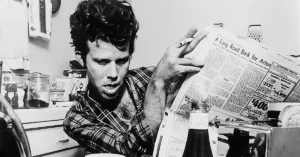Bob Marley & The Wailers: The Legendary Pioneers of Reggae and Global Peace Ambassadors
Bob Marley & The Wailers. Introduction: The Iconic Voice of Reggae and Resistance
Bob Marley & The Wailers are universally recognized as the most influential reggae band in history, and Bob Marley himself remains one of the most iconic figures in global music. Emerging from the vibrant streets of Kingston, Jamaica, in the late 1960s, Bob Marley & The Wailers fused reggae, ska, and rocksteady with powerful social and political messages, inspiring millions worldwide with themes of love, unity, resistance, and hope.
Their music transcended cultural boundaries, making reggae a global phenomenon and turning Bob Marley into a symbol of peace, justice, and Rastafarian spirituality.
Bob Marley & The Wailers. Formation and Early Years
The band initially formed in 1963 under the name The Wailers, consisting of Bob Marley (vocals, rhythm guitar), Peter Tosh (vocals, guitar), and Bunny Wailer (vocals, percussion). Influenced by ska and rocksteady, their early work was rooted in Jamaican popular music traditions, blending upbeat rhythms with soulful harmonies.
In their early years, The Wailers recorded several hits and worked with pioneering producers like Coxsone Dodd and Lee “Scratch” Perry, gradually developing their unique reggae sound.
Bob Marley & The Wailers. Rise to International Fame
Bob Marley & The Wailers gained international attention in the 1970s, especially after signing with Island Records and working with producer Chris Blackwell. Their 1973 album “Catch a Fire” marked a turning point, introducing reggae to a broader audience outside Jamaica.
Subsequent albums such as:
- “Burnin’” (1973): Featuring anthems like “I Shot the Sheriff” (later famously covered by Eric Clapton) and “Get Up, Stand Up.”
- “Natty Dread” (1974): Showcased the band’s deepening Rastafarian beliefs and social commentary, including songs like “Lively Up Yourself” and “Revolution.”
- “Rastaman Vibration” (1976): Their first album to chart highly in the United States, with politically charged tracks like “War” and “Roots, Rock, Reggae.”
Bob Marley & The Wailers. Musical Style and Themes
Bob Marley & The Wailers’ sound is defined by:
- The characteristic reggae rhythm — offbeat guitar chops (skank), deep bass lines, and steady drum patterns.
- Soulful, emotive vocals led by Bob Marley, combined with harmonious backing vocals from the band.
- Lyrics steeped in Rastafarian spirituality, social justice, anti-colonialism, love, and unity.
- Incorporation of elements from ska, rocksteady, and later dub and funk.
Their music served not only as entertainment but also as a voice for oppressed peoples, challenging inequality and promoting peace.
Bob Marley & The Wailers. Legendary Albums and Timeless Songs
Some of the most acclaimed albums include:
- “Exodus” (1977): Featuring iconic songs like “One Love,” “Jamming,” and “Three Little Birds,” this album blends spiritual uplift with infectious rhythms.
- “Kaya” (1978): A mellower, more laid-back album focused on love and marijuana culture.
- “Survival” (1979): A politically charged album emphasizing African unity and resistance.
- “Uprising” (1980): Bob Marley’s final studio album, featuring “Redemption Song,” a profound acoustic anthem for freedom.
The Band’s Impact and Legacy
Bob Marley & The Wailers not only popularized reggae worldwide but also brought attention to social and political struggles through music. Bob Marley became an international symbol of resistance and peace, famously surviving an assassination attempt and participating in peace efforts in Jamaica.
Their music continues to inspire generations, with timeless anthems embraced globally. Marley’s image and songs remain embedded in popular culture, symbolizing hope and resilience.
Band Members and Key Collaborators
- Bob Marley: Lead vocals, rhythm guitar, primary songwriter.
- Peter Tosh: Vocals, lead guitar (early years, left in 1974).
- Bunny Wailer: Vocals, percussion (early years, left in 1973).
- Aston “Family Man” Barrett: Bassist and bandleader.
- Carlton Barrett: Drummer, integral to the reggae rhythm section.
- Other key musicians included Junior Marvin (lead guitar), Tyrone Downie (keyboards), and the I-Threes (Rita Marley, Judy Mowatt, and Marcia Griffiths) as backing vocalists.
Conclusion
Bob Marley & The Wailers are a musical and cultural force whose influence transcends time and geography. Their blend of infectious reggae rhythms and potent messages of freedom and unity carved a permanent place in music history. Bob Marley’s enduring legacy as a musician and humanitarian continues to inspire movements for peace, justice, and equality worldwide.





